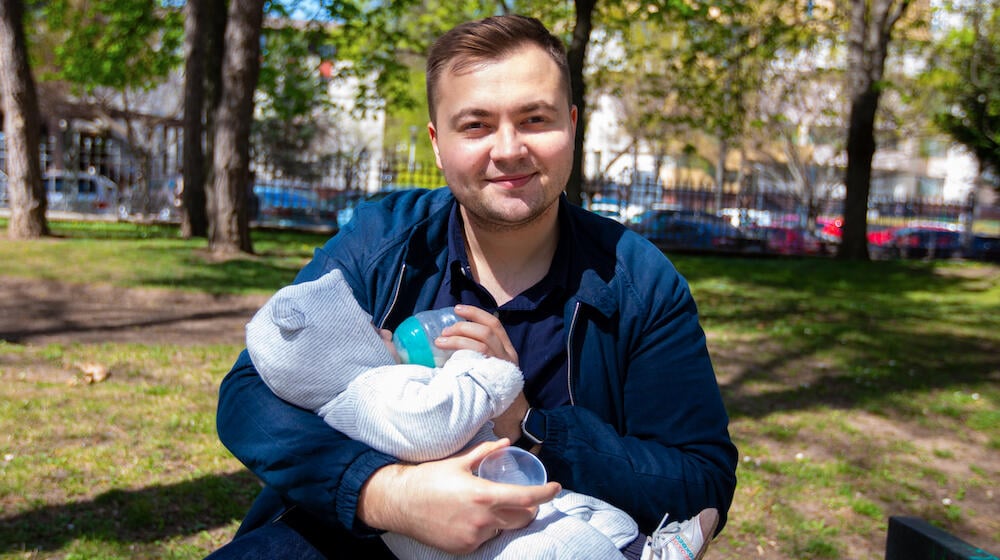“The joy of being a father starts with equal participation alongside the mother in taking care of the child.”
Adrian Băluțel is 29 years old, the father of a four-month baby boy and a Member of Parliament in Moldova. Mr. Băluțel’s rhythm of life changed completely after the birth.
“Before becoming a father, I was a free spirit and I had quite a full social agenda,” he said. “Now, however, almost everything is limited to job duties and coming home before bath time. I want to be with him in the most important moments of his life, and this means that I have to take part in my baby’s daily care routine.”
The young father tries to compensate for the time spent outside home by doing his share of the work around the house in the evening and at the weekend, so that his wife can have “her own time”.
“It wasn’t easy at the beginning, but now I don’t feel tired even when I change diapers during the night. This is my new lifestyle,” he said. “I never thought I would be taking this so seriously, but I’m watching video tutorials about baby development, I’m always looking for new tricks to put my baby to sleep, I’m learning massage exercises and techniques. I’m still discovering myself as a father.”
According to the largest demographic survey ever conducted in the Republic of Moldova in 2021, only 5 per cent of men do their share of cooking, cleaning and other household tasks. The bulk of the work is left for women to do.
Since 2016, new fathers have been able to take 14 days of paternity leave during the first 56 days after the child is born. However, in 2021, only 16 per cent of fathers received paternity benefits. A legislative proposal, proposed in May 2022, aims to extend the paternity leave application period from 56 days after a child is born to 1 year. Mr. Băluțel believes this will play a significant role in promoting paternity leave and confirm the importance of the father's role in the care of newborn children.
“Many men are probably still reluctant to apply for paternity leave due to the stereotype that men have to ensure the economic security of the family,” said Mr. Băluțel. “But times change, and both women and men are responsible for the family that they created together.”
As part of the Expanding Choices Programme in Moldova, UNFPA works on expanding family-friendly policies at the national legislative level and in the workplace, and cooperates with the private sector to broaden opportunities for women and men. Through its programmes, UNFPA encourages men in Moldova to share in childcare responsibilities, and to apply for paternity and childcare leave.
“Many fathers told me that, unfortunately, when they became parents, they couldn’t benefit from paternity leave, because this right was not offered by law or even worse – it was not a socially-accepted practice that fathers take paternity leave and spend a month at home with their family,” said Mr. Băluțel.
“Of course, my son will not remember our first meeting, but I can see his reaction to my voice,” said Adrian. “I recently took part in a TV programme and he flinched when he heard me on TV. He recognized me, and this makes me believe that our tradition of talking to him since he was in his mother’s womb created a special link between us.”
UNFPA's Demographic Resilience programme assists countries in the region with strengthening their capacity to understand and anticipate the population dynamics they are experiencing, and ensure they have the skills, tools, political will and public support to manage them.



